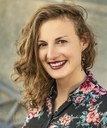Miriam Neuhausen
Miriam Neuhausen
 Lecturer & Doctoral Candidate she/her
Lecturer & Doctoral Candidate she/her
English Linguistics | Mair
ˈmɪɹɪjəm ˈnɔɪhaʊzn
miriam.neuhausen@anglistik.uni-freiburg.de
R 4222
I am a Ph.D. student in English linguistics and conduct research on a secluded bilingual Pennsylvania German-speaking community in Ontario, Canada. I am primarily interested in how language is used in lesser-studied multilingual communities and how speakers in these communities use language to express different identities.
RESEARCH INTERESTS
- Sociolinguistics
- Language and identity
- Sociophonetics
- Language contact
- Language variation and change
- Lesser-studied languages and communities
- Language and social injustice
ACADEMIC BACKGROUND
| since 2020 |
Ph.D., English Linguistics |
| 2016 – 2020 |
M.A., English Linguistics |
| 2018 – 2019 |
Visiting Scholar |
| 2015 – 2016 |
International Student |
| 2012 – 2016 |
B.A., English/Romance Studies |
SCHOLARSHIPS/FUNDING
| since 2020 | Landesgraduiertenförderung Ph.D. scholarship |
| 2019 | Verband der Freunde der Universität Freiburg e.V. grant for a conference talk at NWAV48,University of Oregon |
| 2018 – 2019 | DAAD-PROMOS "Thesis abroad" scholarship for a research stay abroad, University of Toronto |
| 2015 – 2016 | Erasmus+ scholarship for two semesters abroad, University of Southampton |
AWARDS
| 2021 | Prix Bartholdi |
| 2021 | Stephen-Crane-Forschungspreis für nordamerikanische Literatur- und Kulturwissenschaften |
| 2020 | ICR Outstanding International Thesis Award |
EMPLOYMENT
| since 2021 | Research fellow & lecturer, University of Freiburg |
| 2021 | Co-organiser of the 43rd Annual Conference of the German Linguistic Society, Hermann Paul School of Linguistics |
| 2017 – 2019 | Research assistant & tutor, University of Freiburg |
PUBLICATIONS
-
(accepted) Miriam Neuhausen. Adjusting data collection in New Englishes communities: The sociolinguistic interview and Old Order Mennonites. IN New Englishes, New Methods: Methodological considerations for the study of New Englishes, eds.: Guyanne Wilson & Michael Westphal, series: Varieties of English around the world, ed. Stephanie Hackert, John Benjamins.
-
(accepted) Axel Bohmann, Julia Müller, Mirka Honkanen & Miriam Neuhausen. A diachronic look at the English passive: Distributional semantics of be versus get. IN Language and linguistics in a complex world, eds. Ingo H. Warnke & Beate Busse, series: Discourse patterns, De Gruyter.
OUTREACH/SCIENCE COMMUNICATION
- Science Slam, Wissenschaftliche Gesellschaft Freiburg (2021)
- Blog post, Canadian Language Museum (2021)
- Representation of the Freiburg English Linguistics department, Freiburger Wissenschaftsmarkt (2017)
CONFERENCE TALKS
-
CoTiSp (Language Contact through Time and Space), University of Bayreuth (2021): “Dialect contact and stance-taking in a remote Mennonite community in Canada”
-
ISLE (International Society for the Linguistics of English), University of Eastern Finland (2021): “Dialect contact and performance in a Mennonite community”,
-
Imagining Canada: “Discovering” & navigating “all our relations” in an (un)common country, University of Freiburg (2020): “Discovering home, navigating language change, imagining identities—Old Order Mennonites in southern Ontario”
-
IRG Symposium 2020, University of Fribourg, Switzerland (2020): Poster presentation „A diachronic look at the English passive: Distributional semantics of be versus get” with Julia Müller
-
Workshop Fieldwork in New Englishes, University of Freiburg (2019): “Out in the field: Old Order Mennonites and the Wit’suwit’en First Nations” (with Sonya Kinsey)
-
NWAV48 (New Ways of Analyzing Variation), University of Oregon (2019): “To raise or not to raise: Pennsylvania German English in Canada”
TEACHING
- Sociophonetics
- Third Wave sociolinguistics: Language variation in Canada and the U.S.
- Hands-on sociophonetics

